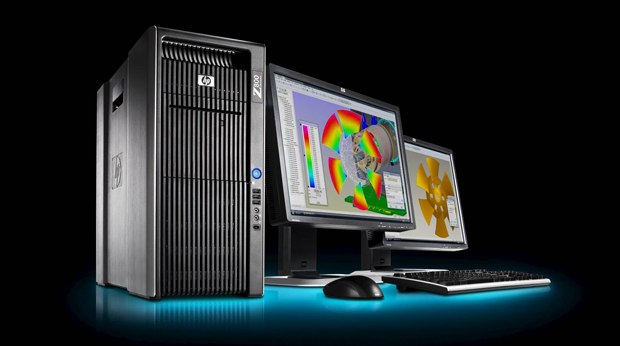Bryan Hoff evaluates a major Intel core increase for the new HP Z800.
In an attempt to keep up with Moore's Law, computer processors are now gaining cores rather than seeing major increases in GHz speeds. Hence, we're seeing new processors from Intel that contain 6 cores but are still clocked at 3.33 GHz rather than pushing the 4 GHz threshold. That said, the more cores you bring to the party the better, in my opinion.
The Z800 I reviewed boasted dual 6-core Xeon X5680 (Westmere) 32 nm processors clocked at 3.33 GHz, 12 GB RAM, and an NVIDIA Quadro FX 5800 video card. It also came with a 146 GB SAS drive at 15,000 RPM, 1 TB data drive and a slot-loading DVD drive. As configured, the system retails for $13,470 while the base price for the Z800 is $1,799. They have you covered at every level, whether startup or corporation.
If you're not familiar with the Z800, I suggest you visit HP's site and take a tour. Their tool-less case design is a feat of engineering. The system can handle up to 192 GB or RAM, dual Quadro FX 5800 video and 4 eSATA hard drives. If you want liquid cooling HP has you covered there as well.
For Animators and VFX Artists
Obviously, these systems are intended for the complete range of users, including CADD, oil and gas and the financial sectors. However, I'm going to focus on its benefits for animators and vfx artists. And if you're anything like me, you'll probably get pretty excited when you see 24 buckets rendering in 3ds Max!
When I told my friend who owns a vfx company in Vancouver about the new Z800 system I was reviewing, I could almost hear the drool through his instant message. He's still laboring away on a 5-year-old Boxx system. But demanding apps are requiring more memory and processing power all the time. Whether you're modeling, rendering or compositing, the more resources you have at your disposal the better. Again, HP has you covered. And I think my friend is even more tempted to upgrade.
The Z800 can handle anything you throw at it -- from 3ds Max to Maya, and compositing software to boot. I had a tough time bringing the system to its proverbial knees.
SpecViewPerf scores
Moving from Windows XP to Windows 7 means SpecViewPerf 9 no longer works, so I am now using version 10 to do my testing. Luckily, I ran SpecViewPerf 10 when testing the original Z800, so at least this is a real apples-to-apples comparison. As you can see from the results, the Quadro FX 5800 card in the current system outpaced the 4800 card in the previous system in every test. This shouldn't be a surprise to anyone.
HP Z800 2009 (SpecViewPerf 10)
SUM_RESULTS\3DSMAX\SUMMARY.TXT 3dsmax-04 Weighted Geometric Mean = 52.92
SUM_RESULTS\CATIA\SUMMARY.TXTcatia-02 Weighted Geometric Mean = 62.95
SUM_RESULTS\ENSIGHT\SUMMARY.TXTensight-03 Weighted Geometric Mean = 52.57
SUM_RESULTS\MAYA\SUMMARY.TXTmaya-02 Weighted Geometric Mean = 208.46
SUM_RESULTS\PROE\SUMMARY.TXTproe-04 Weighted Geometric Mean = 61.31
SUM_RESULTS\SW\SUMMARY.TXTsw-01 Weighted Geometric Mean = 133.83
SUM_RESULTS\UGNX\SUMMARY.TXTugnx-01 Weighted Geometric Mean = 32.39
SUM_RESULTS\TCVIS\SUMMARY.TXTtcvis-01 Weighted Geometric Mean = 28.28
HP Z800 2010 (SpecViewPerf 10)
SUM_RESULTS\3DSMAX\SUMMARY.TXT3dsmax-04 Weighted Geometric Mean = 57.91
SUM_RESULTS\CATIA\SUMMARY.TXTcatia-02 Weighted Geometric Mean = 69.86
SUM_RESULTS\ENSIGHT\SUMMARY.TXTensight-03 Weighted Geometric Mean = 53.59
SUM_RESULTS\MAYA\SUMMARY.TXTmaya-02 Weighted Geometric Mean = 212.61
SUM_RESULTS\PROE\SUMMARY.TXTproe-04 Weighted Geometric Mean = 63.40
SUM_RESULTS\SW\SUMMARY.TXTsw-01 Weighted Geometric Mean = 141.06
SUM_RESULTS\UGNX\SUMMARY.TXTugnx-01 Weighted Geometric Mean = 32.74
SUM_RESULTS\TCVIS\SUMMARY.TXTtcvis-01 Weighted Geometric Mean = 37.56
I was hoping to include Specapc for 3ds Max in the mix this time, but unfortunately I experienced some puzzling errors that kept the tests from completing. Believe me, I tried.
The 3ds Max Tests
What would a review be without my 3ds Max 8 render tests? In case you're unfamiliar, these are tests run under 3ds Max 8 with no service packs installed. You can look back through some of my older reviews to see the specs on the original Z800 and the xw8600 systems in the following comparison. The new system shaved a full minute and two seconds off the original's score in the Displacement & DOF.max render test, and cut 16 seconds off the Light Gallery test.
Displacement & DOF.max
HP xw8600 - 5:25 HP Z800 (2009) - 4:30 HP Z800 (2010) - 3:28
Light Gallery
HP xw8600 - 0:55 HP Z800 (2009) - 0:50HP Z800 (2010) - 0:34
Final Impressions and Recommendations
After a year, I'm still quite enamored with the Z800's case design. It's an industrial work of art that you'll want to display on top of your desk, rather than underneath it. And if what's inside counts, you have nothing to worry about there.
My two main beefs -- however small-- both revolve around the slot-loading DVD drive. It seemed a little slow transferring data off a CD, and a bit of a pain to eject media, since it had no eject button. I cracked open the case and took a look and it was an eSATA drive, which made me even more curious. That said, performance is not a deal-breaker, especially since USB sticks work better for file transfers anyway.
Previous beefs aside, installing programs is extremely quick -- probably thanks in part to the Z800's 15,000 RPM hard drive. And if speed is key, then this is your system. As the axiom goes, sometimes it really does take money to make money.
Bryan Hoff is a multifaceted artist and writer. A web designer, digital artist and animator, his credits include movie and television effects, online games, 3D corporate animation, Flash and traditional Web site design. His writing credits include articles for LinuxWorld, Element K Journals and InformIT, covering such topics as Photoshop effects, Linux 3D graphics applications, Web and HTML design, RSS feeds and painting with a graphics tablet. Hoff has written eBooks on blogging and Web site creation for beginners and co-authored the book Moving from Windows to Linux.









